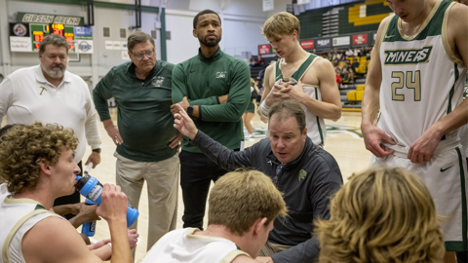Bridging Leadership Lessons from the Workplace and Those Experiences Shaping Today's Youth and Tomorrow's Leaders
 Coach Bill Walker speaking with his team during a timeout. Photo by Mike Pierce. Coach Bill Walker speaking with his team during a timeout. Photo by Mike Pierce. I love sports. The competition, the environment, the team concept. The many life lessons that come from playing a game is something I have always enjoyed. I specifically love the game of basketball. This love was fostered by my parents throughout our family as they taught us to enjoy both the simplicity and the complexity as well as the power and the grace. They shared with us their passion and love of the game and their competitiveness. I became a student of the game early, spending time watching games and having my dad share his thoughts and perspectives. We would watch college and NBA games live and sometimes record them so we could review plays later. In those days it was Beta tapes and then VCRs! We didn’t have DVR and live playback like today. Later, it would be my own games where we would hook up the camera to the TV when we got home from the games, and we would stay up late rewatching the game. We would review to see where I was successful and where I could improve from a teacher's perspective focused on growth. Where I currently live, we have a Division II school, Missouri S&T, from which I graduated and since I am a basketball fan, I try to attend as many of the games as I can. Being a smaller school, you can build relationships with the coaching staff and players. The smaller gym size enables you to have great seats, in an intimate environment where you can engage and be part of the experience. My sons have been ball boys and attended their camps. The youth organization I lead has been fortunate to be able to attend games, perform at halftime, attend practices, and have the players attend their practices. I would always have my teams attend the games, where we would sit directly behind the bench and observe how the skills, they worked on in practice translated to game situations. A few days after my father passed away, I attended the game and the Coach at the time, Jim Glash, came around the bench, up into the stands to share his condolences with me - as did all the young men who were getting ready to play the game. At a recent game I attended, the Missouri S&T Miners were blowing out their opponent midway through the second half. These situations can always be challenging for a head coach when you are clearly the superior team. Does Coach Walker sit back, let his kids play and just get the game over with? Or does he continue to coach and focus on his team's development? Coach Bill Walker chose the latter. On back-to-back trips on the defensive end, one of his players, a young promising freshman, was blasted by a high ball screen at mid-court. After the first screen, Coach Walker hollered out “call out the ball screens!” When the same thing happened on the next trip, Coach Walker jumped to his feet and awaited the change of possession so he could call a timeout. With 7:20 left in the second half, his team leading 79-35, Coach Walker called the timeout and didn’t wait for his team to come to the bench. He met them at mid-court, turned to his bench and instructed them to gather around. The players didn’t need to hear Coach Walker’s voice to comprehend the intensity with which he was addressing them as it was emitted from his very being. Coach Walker clearly and directly articulated the importance of being a member of a team. He reinforced that it is unacceptable to let a teammate get screened in such a manner and how, when you are part of a team, you are always looking out for the welfare of your teammates. He challenged them to talk with each other on the court, help your teammate learn and point out when behaviors need to change. He drove home the expectations he had for them as players and as young men and how anything less than that was unacceptable. What I appreciated most about observing this event was that while he started with frustration, it quickly moved to intensity and passion. This transition moved to completion as he finished with teaching and motivation. His devotion and caring about the young men showed that regardless of the score, he was there to make an IMPACT. The 3 Pillars of Impact that I have written about before, Courage to Challenge, Expect Excellence and Empower Others were on full display. The players have all been playing the game of basketball for over 10 years and calling out screens is something they all knew was important. But coaching is always needed, whether you are inexperienced or a veteran. Coach Walker could have let it slide and talked about it during film study but knew that his role as a coach is bigger than X’s and O’s but about development of young men. Coaching and being willing to be coached is essential to a person’s development Beyond Today.
0 Comments
Leave a Reply. |
AuthorTom Brown - a husband and a father who is simply trying to make a difference. Using my experience as a Manufacturing Executive to connect leadership from the boardroom to the hardwood to help teams grow and develop to make a difference in the lives of others. Archives
May 2024
Categories |
Proudly powered by Weebly

 RSS Feed
RSS Feed

